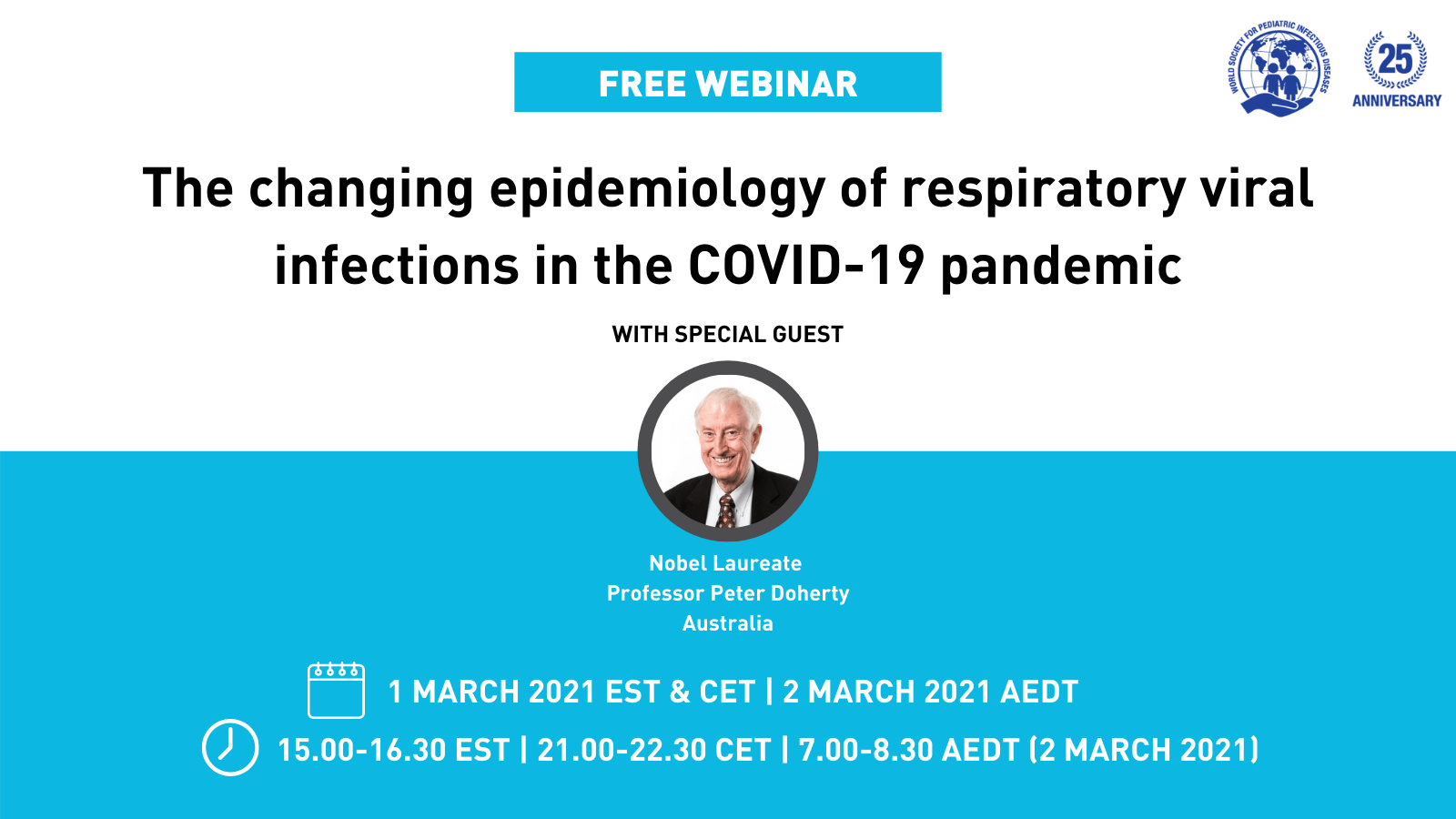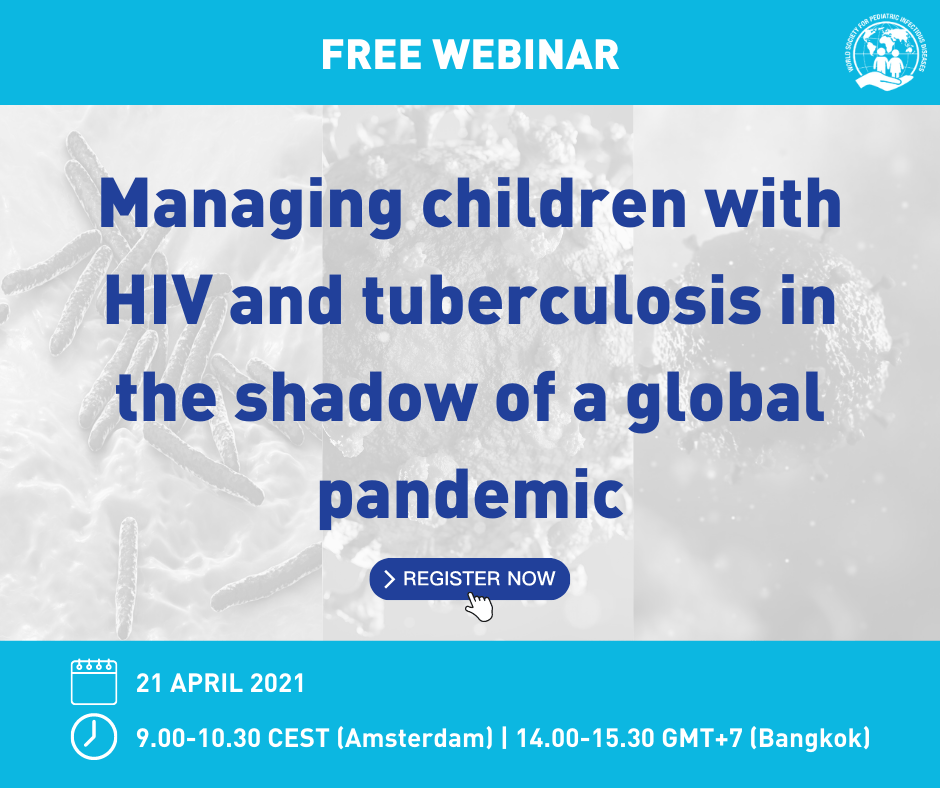New WSPID Webinar Series
WSPID will produce a series of 10 webinars. Enjoy the first two webinars focusing on COVID-19 and children.
Description: In this session, 3 specialists provide their perspectives on the impact of COVID-19 in the pediatric population in 3 talks. The session concludes with a brief Q&A.
- Worldwide impact in children under 18 years of age: infection and severity
- The role of children in transmission
- Multisystemic inflammatory syndrome in children
Speakers:
- Susanna Esposito – Full Professor of Pediatrics and Director of the Pediatric Clinic at University of Parma, President of the World Association for Infectious Diseases and Immunological Disorders
- Juan Pablo Torres – Pediatric Infectious Diseases, PhD, Associate Professor and Director of Innovation, Faculty of Medicine, University of Chile
- Marco Aurélio Palazzi Sáfadi MD, PhD – Pediatric Division Head, Santa Casa de São Paulo School of Medical Sciences
Moderators:
- Mark Cotton – Distinguished Professor at Stellenbosch University, President of WSPID.
- Miguel O’Ryan MD – Professor, Faculty of Medicine, University of Chile, Advisor for Covid19 to the Health and Science and Technology Ministries, Chile, Coordinator International Scientific Committee WCPID.
You can now watch the recording of WSPID’s webinar – The Impact of COVID-19 in the Pediatric Population.
Description: Record numbers of children and youth are not attending school because of closures mandated by governments in an attempt to slow the spread of COVID-19. The impact and effectiveness of these measures are the subject of this free WSPID webinar: Schools in the COVID-19 era – to be or not to be?
Join us for presentations and a panel discussion on the best available evidence on the role of school closure and opening in the present and future of the pandemic.
Speakers:
- Dr Archana Koirala MBChB, MIPH, FRACP: Available evidence on the issue of schools as a driver for epidemic spread.
- Prof Ameena Goga, FP(Paed), PhD: In-depth analysis of delaying school physical presence on psychological/emotional/social aspects of children.
Moderators:
- Prof Fiona Russell, BMBS GradDip (Clin Epi) Dip Paeds MPHTM FRACP PhD
- Mark Cotton, MD, PhD
Panelists:
- Professor Kristine Macartney
- Dr Archana Koirala MBChB, MIPH, FRACP
- Prof Ameena Goga, FP(Paed), PhD
You can now watch the recording of WSPID’s webinar – Schools in the COVID-19 era – to be or not to be?
Download the speaker presentations Archana Koirala and Ameena Goga
Key points:
- The single best policy to support school reopening prior to the development of a vaccine or treatment is the suppression of COVID-19 to near zero case incidence in the broader community. This can be achieved via universal mask wearing, social distancing, reduction or elimination of indoor gatherings, staying home when sick, and rigorous and timely Testing, Tracing and Isolation within 48 hours of a notification.
- Schools should be prioritised for reopening and staying open to guarantee equitable learning environments and lessen social and educational effects of school closure.
- Closing schools should be a last resort, especially for kindergartens and primary schools as children in these age groups are less likely to transmit and be associated with an outbreak.
- There should be a staged mitigation approach to opening up and staying open.
Other useful school related resources:
WHO
Schools and other educational institutions transmission investigation protocol for COVID-19
Systematic review on children and transmission
https://academic.oup.com/jid/advance-article/doi/10.1093/infdis/jiaa691/5943164
Victorian school outbreak report
https://www.dhhs.vic.gov.au/sites/default/files/documents/202009/Report-summary-COVID-19-in-victorian-schools-pdf.pdf
Description: Presentations and a Q&A on the different COVID-19 vaccine platforms and an update on the stage of clinical development
Speakers:
- Miguel O’Ryan – Full Professor, Faculty of Medicine University of Chile, Member Covid19 Vaccine Committee, Ministry of Science, Chile, and President International Scientific Committee WSPID 2019/2021. Update on COVID-19 vaccine platforms and current stage of clinical development.
- Walter Orenstein – Associate Director of the Emory Vaccine Center, Former Director, United States Immunization Program, and a former Assistant Surgeon General of the United States. Overview of current vaccine rollout plans.
You can now watch the recording of WSPID’s webinar – COVID-19 vaccines coming to light: current developments and near-future use and challenges?
Download the speaker presentation – Walter Orenstein
Description: Presentations and a Q&A on ‘The changing epidemiology of respiratory viral infections in the COVID-19 pandemic’ with special guest Nobel Laureate Professor Peter Doherty (Australia).
Speakers:
- Is SARS-COV-2 really a respiratory infection in children? – Helena Rabie & Andrew Redfern (South Africa).
- Where have all the other respiratory viruses gone? – Sheena Sullivan (Australia).
- What have we learned about RSV epidemiology and prevention? – Juan-Pablo Torres (Chile)
Description: Join us for presentations and a Q&A on managing HIV and tuberculosis in children in the midst of a global pandemic.
Speakers: Usa Thisyakorn (Thailand), Marieke van der Zalm (South Africa), Harsha Lochan (South Africa)
Programme:
1. Frontline experience of managing children with HIV and tuberculosis infections in a pandemic (Harsha Lochan)
2. The prevention of mother to child transmission (PMTCT) of HIV: gains and losses over 25 years (Usa Thisyakorn)
3. Diagnosing childhood TB in the face of COVID-19 (Marieke van der Zalm)
Learning Objectives:
1. Lessons learnt from the COVID pandemic in managing children with HIV and TB
2. The prevention of mother to child transmission strategies
3. Update on diagnostics in childhood tuberculosis

